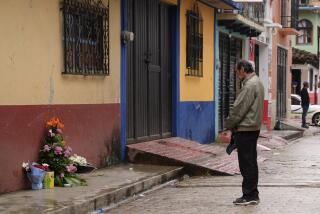Rights Groups Become Targets
- Share via
BOGOTA, Colombia — For more than a decade, Colombian human rights activists have denounced the killings of leftist politicians, union leaders, journalists and peasants caught in the middle of the country’s long civil war.
Now they are denouncing the assassinations of their colleagues--and taking precautions because of threats to their own lives.
“We have become the objects of our own work,” said Agustin Jimenez, a lawyer with the Committee in Solidarity with Political Prisoners, a public-interest law firm. “We have gone from protecting others to protecting ourselves.”
Last year, 17 human rights activists were killed and two dozen were threatened, according to the Colombian Jurists’ Commission.
Statistics are not yet available for 1998, but two high-profile killings, in late February and mid-April, have made it clear that the killings have not stopped.
Police believe that the same hit squad of two men and a woman posing as journalists killed both Jesus Maria Valle, chairman of the Human Rights Committee for Antioquia, a war-torn northern province, and Eduardo Umana, a lawyer who defended political prisoners, including guerrillas.
Beyond that, the authorities have no leads, said Luis Enrique Montenegro, Colombia’s head of police intelligence.
“These are not isolated incidents,” said Jorge Rojas, director of the group Consultants for Human Rights and Displaced Persons. “There is a message of terror and fear that these murders have generated. Above all, the message is, ‘You are not safe, even in your office or at home’ because that is where they have [killed] people.”
By posing as journalists, the assassins have also made human rights activists cautious about meeting with reporters, who had been an important outlet for information.
Observers say the killers’ motive is clear.
“What this demonstrates is the level of intolerance that some radical elements of the country have reached,” the weekly newsmagazine Semana said.
After Umana’s killing last month, President Ernesto Samper met with human rights groups to offer them a $1.2-million security program that provides everything from cellular telephones and steel doors on their offices to bulletproof vests, self-defense courses and bodyguards.
Some organizations have accepted the steel doors, but the idea of bodyguards appalled activists.
“Arming ourselves is not compatible with our existence as defenders of human rights,” Rojas said.
The activists say what they really want is for the government to tone down the rhetoric of politicians and military officials. The military routinely accuses rights groups of overlooking abuses by the country’s insurgents and focusing on the army’s mistreatment of civilians.
Further, activists say, intelligence reports have linked lawyers who defend guerrillas to the insurgent movements, which are financed by a combination of kidnapping ransoms, extortion and “taxes” on cocaine and heroin production.
“The former governor of Antioquia said that we were a parallel diplomacy internationally for the guerrillas,” Jimenez said.
Military officials have accused his group of taking money obtained through guerrilla kidnappings, he added.
In reality, Jimenez said, the lawyers are funded by donations from Swiss, Swedish, German and British civic groups.
The activists believe that such disinformation encourages attacks by extremists, and the rights advocates who met with Samper demanded that he order a review of intelligence files to rid unproven references to their groups as subversive.
They also insisted that Samper enforce a directive, issued last year, that cautions both armed forces and government officials not to make disparaging remarks about human rights activists.
More to Read
Sign up for Essential California
The most important California stories and recommendations in your inbox every morning.
You may occasionally receive promotional content from the Los Angeles Times.










